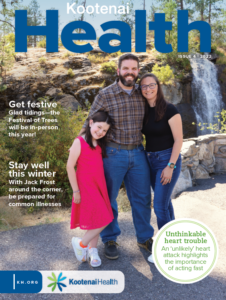 It was a rainy night in June of this year when Michael Delfino and his family were camping 15 miles outside of Coeur d’Alene.
It was a rainy night in June of this year when Michael Delfino and his family were camping 15 miles outside of Coeur d’Alene.
Michael woke up in the morning to the family puppy crawling on his chest. While trying to get the puppy off, he felt his chest suddenly tighten.
“I thought I broke a rib trying to get the dog off me,” said Michael. “I leaned up, stretched my shoulders back and tried to stretch my ribs out. It wasn’t giving me any relief.”
Despite the excruciating pain, Michael could still think straight. He and his wife, Jenny, rationalized that he might be having a panic attack, which he had seen her have in the past.
“He kept saying he needed to stretch,” said Jenny. “But his eyes didn’t look right, and I could tell that something was very wrong.”
Swift action
They realized every minute was precious and quickly drove to Kootenai Health’s emergency department. When they arrived and the emergency medical team heard Michael’s symptoms, they wasted no time.
Michael, who was 34 at the time, was experiencing the seemingly unthinkable for a young, healthy person: He was having a heart attack.
“When I walked in, I just told them my heart really hurts,” said Michael. “The team instantly took action—putting me in a wheelchair and rushing me back to the cath lab.”
Before Michael knew it, the nurses had removed his shirt and shoes, attached electrocardiogram (EKG) pads to his chest to monitor his heart and started an IV drip. He was also given a blood thinner and medication to help relieve the chest pain.
The pain showed no signs of stopping. Michael was now going into ventricular fibrillation, or VFIB—a condition that causes the heart to beat faster and out of rhythm.
“They had to shock me and do CPR,” said Michael. “I woke up not knowing what happened, but I felt perfectly fine after that.”
During this ordeal, Kootenai Heart Clinics cardiologist and surgeon Ronald Jenkins, M.D., performed an emergency thrombectomy, placing a catheter in Michael’s left artery to open it up. Dr. Jenkins was then able to successfully remove a blood clot, the cause of Michael’s heart attack.
“In Michael’s case, the clot became lodged in the artery, split off and then moved, blocking the ends of two other arteries,” said Dr. Jenkins. “Most of the clot came out during the thrombectomy. Once the clot was cleared, Michael’s chest pain went away, his EKG went back to normal and his heart damage was minimal.”
‘We’re really lucky’
Michael’s recovery after his heart attack has gone smoothly. He spent three days in the hospital and rested at home for the next two weeks. After the Fourth of July, nearly a month after his heart attack, he started to feel back to normal.
“We’re really lucky to have been at Kootenai Health,” said Michael.
Michael and his family had always led an active and healthy lifestyle, and this scare led them to finely tune those healthy lifestyle choices even further. He has reduced his stress, bumped up his activity level and adheres to an even more healthy diet. They took CPR classes and purchased an at-home AED (automated external defibrillator) kit. Jenny also keeps CPR masks with her in case of an emergency.
“I’ve let a lot of things go the last couple of weeks that would have normally made me angry,” said Michael. “Life happens. Jenny and I are tracking what we eat. She teaches exercise classes, so she’s already doing a lot of cardio. I’ve started riding my bike even more.”
While a nutritious diet and regular physical activity are key to optimal heart health, Dr. Jenkins stressed the importance for everyone—even those as young as 20 to 50—to monitor their blood pressure and cholesterol and be open with their primary care physicians about a family history of heart conditions.
Michael’s father had died due to a combination of health issues, but it was discovered after he’d passed that he’d had an enlarged heart. “Unfortunately, it sometimes takes a health scare for young people to take their heart health seriously,” said Dr. Jenkins. “If there’s a family history of heart conditions, young people should not wait until their first heart attack to be on top of their heart health.”
Phenomenal care
Jenny will never forget the kindness the entire medical staff showed her and her family on that day. “The whole team at Kootenai was phenomenal in how they took care of everything,” said Jenny. “Volunteers even brought our 8-year-old daughter, Mackenzie, a coloring book while we were with Mike in his room.”
Jenny is convinced that the swift actions of Kootenai Health’s emergency team saved Michael’s life.
“I’ve never seen a group of people work so quickly in complete unison,” said Jenny. “It was a beautiful thing.”
Heart care close to home
Kootenai Heart Clinics are located in Coeur d’Alene, Post Falls, Sandpoint and Lewiston, plus in satellite locations across northern Idaho and in Libby, Montana. Visit KH.org/heart-services/kootenai-heart-clinics for details.

